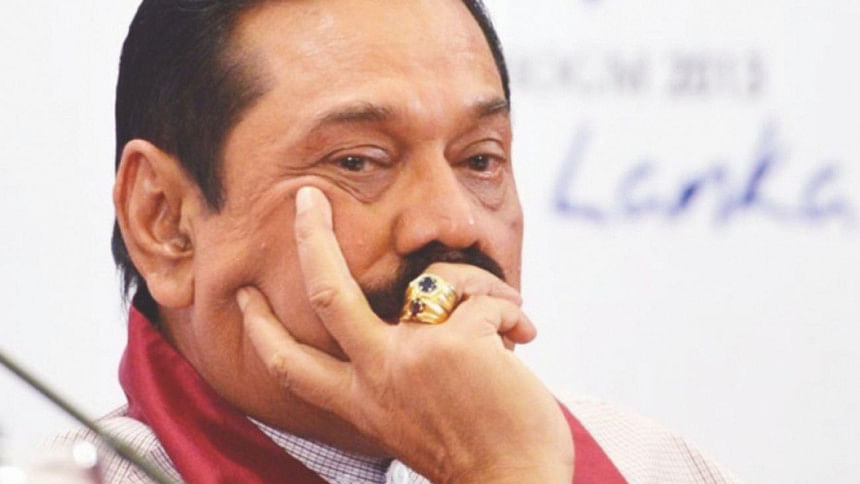SRI LANKA PARLIAMENT ELECTIONS: THE RAJA FACTOR

SINCE the 1950s, Sri Lanka has had a predominantly two-party political system. But in recent years, its politics has become very complex with splits in parties, massive defections, and regrouping of parties under new alliances. This is quite organic in nature – constantly growing in different directions. It is difficult to discern who is loyal to whom in this situation. The country has gradually moved towards coalition governments, as neither party has been able to secure a majority of its own to form a government.
Centre-left SLFP, led by Maithripala Sirisena, and centre-right UNP, led by Ranil Wickremasinghe, have been political foes for long. But that did not stop them from coming together and ousting Mahinda Rajapaksa during the last presidential elections.
In January 2015, Maithripala Sirisena won the presidential election by defecting from the Sri Lanka Freedom Party (SLFP) to become a common opposition presidential candidate. Sirisena was supported by the then opposition in parliament, United National Party (UNP), and other smaller parties opposed to Rajapaksa's misrule.
After winning the election, Sirisena formed a minority government with Ranil Wickrremasignhe as prime minister. Sirisena promised reforms to undo the damages done to public institutions by Rajapaksa. But those reforms could not make much headway, as Rajapaksa loyalists repeatedly crippled parliament proceedings. Sirisena, however, succeeded in pushing through the 19th amendment of the constitution, which limits a president to a maximum of two 5-year terms. He also transferred some powers of the president to the parliament.
The United People's Freedom Alliance (UPFA) is a coalition of several parties – the SLFP being the largest. Following his defeat, Mahinda Rajapaksa resigned as party chairman and handed over the reins of the SLFP and UPFA to Sirisena. Unfortunately, the SLFP is a divided house – one faction formally led by Sirisena and the other blindly loyal to Rajapaksa.
It is awkward for Sirisena to preside over the SLFP where Rajapaksa is still a party member. After his defeat at the presidential elections, many had expected Rajapaksa's political career to be over. But that did not happen.
It is in this setting that Sirisena dissolved the parliament on June 26, 2015 and called for fresh elections.
As president, Sirisena has to be neutral. But as party chairman, he had to acquiesce to the nomination of Rajapaksa to run for a parliament seat. Many see this as a "betrayal." Sirisena, hurt by these allegations, addressed the nation on July 14. "Mahinda Rajapaksa who was defeated on January 8 will be defeated again …. No other president has been attacked the way I have in the past two weeks – they call me a traitor and a brute. Today you are tasting the fruits of democracy," remarked Sirisena. He promised not to betray the silent revolution of January 8 or permit the restoration of the one-family rule in Sri Lanka.
Rajapaksa's re-entry into politics has changed the total complexion of the election. He organised large rallies and spoke as though he was the PM candidate. He is still popular and has taken the centre stage in the campaign. He addressed the war victory of the LTTE, nationalism, and security threats to rally support from the Sinhalese Buddhist vote bank. "I will be contesting the parliamentary election with a view to forming the next government," Rajapaksa declared. However, LTTE war crimes and abuse of power during his presidency continue to haunt him.
If he wins and succeeds in getting support from his loyal faction, he will certainly try to become the prime minister and form the next government. Becoming the prime minister is vital for him to escape from the litany of corruption and bribery charges that he now faces.
Rajapaksa's aggressive campaign has created a new political polarisation in Sri Lanka. It not only alarmed the democracy-minded SLFP activists, but also drove Ranil Wickremansinghe to form a new alliance.
On July 12, UNP, Sri Lanka Muslim Congress (SLMC), Tamil Progressive Alliance (TPA), Jathika Hela Urumaya (JHU) and anti-Rajapaksa members of the SLFP signed agreements to form the United National Front for Good Governance (UNFGG). The radical left Janata Vimukthi Peramuna (JVP) agreed to support the UNFGG from outside. Sirisena apparently has given tacit support to UNFGG.
However, over the past months, relations between Sirisena and Prime Minister Ranil Wickremasinghe have soured. He is seen in political circles as a Jekyll and Hyde character. President Sirisena cannot put his entire weight behind Wickremasinghe and ask voters to support UNFGG. At the same time, Sirisena cannot depend entirely on SLFP, as he is not at its helm. He hopes that anti-Rajapaksa members will back him and eventually eliminate Rajapaksa from the scene. He can then build a reformed SLFP.
It is a peculiar challenge that Sirisena faces. He cannot trust Ranil Wickremasinghe because of ideological reasons. He wants to see Rajapaksa ousted from Sri Lankan politics, but cannot stop him. Actually, he is isolated from both SLFP and UNFGG. Indeed, it is a catch-22 situation for Sirisena.
Sri Lanka's 15 million voters will elect the 15th parliament for 5 years on August 17, 2015. The alliance winning at least 113 seats in the 225-seat house will form the government.
Opinion polls conducted by the Centre for Policy Alternatives suggest that the UNFGG will get 39.8 percent of the votes and Rajapaksa will receive 27.5 percent of the votes. UNFGG is likely to win because of support from Muslims and Tamils.
Sri Lanka's democratic renaissance of January 2015 can be consolidated if a broad pro-democracy alliance wins a clear majority and forms a national government. That shall eliminate Rajapaksa for good.
Nevertheless, the political discourse surrounding the parliamentary elections in Sri Lanka has changed remarkably because of the Rajapaksa factor.
The writer is former Ambassador and Secretary.

 For all latest news, follow The Daily Star's Google News channel.
For all latest news, follow The Daily Star's Google News channel. 



Comments